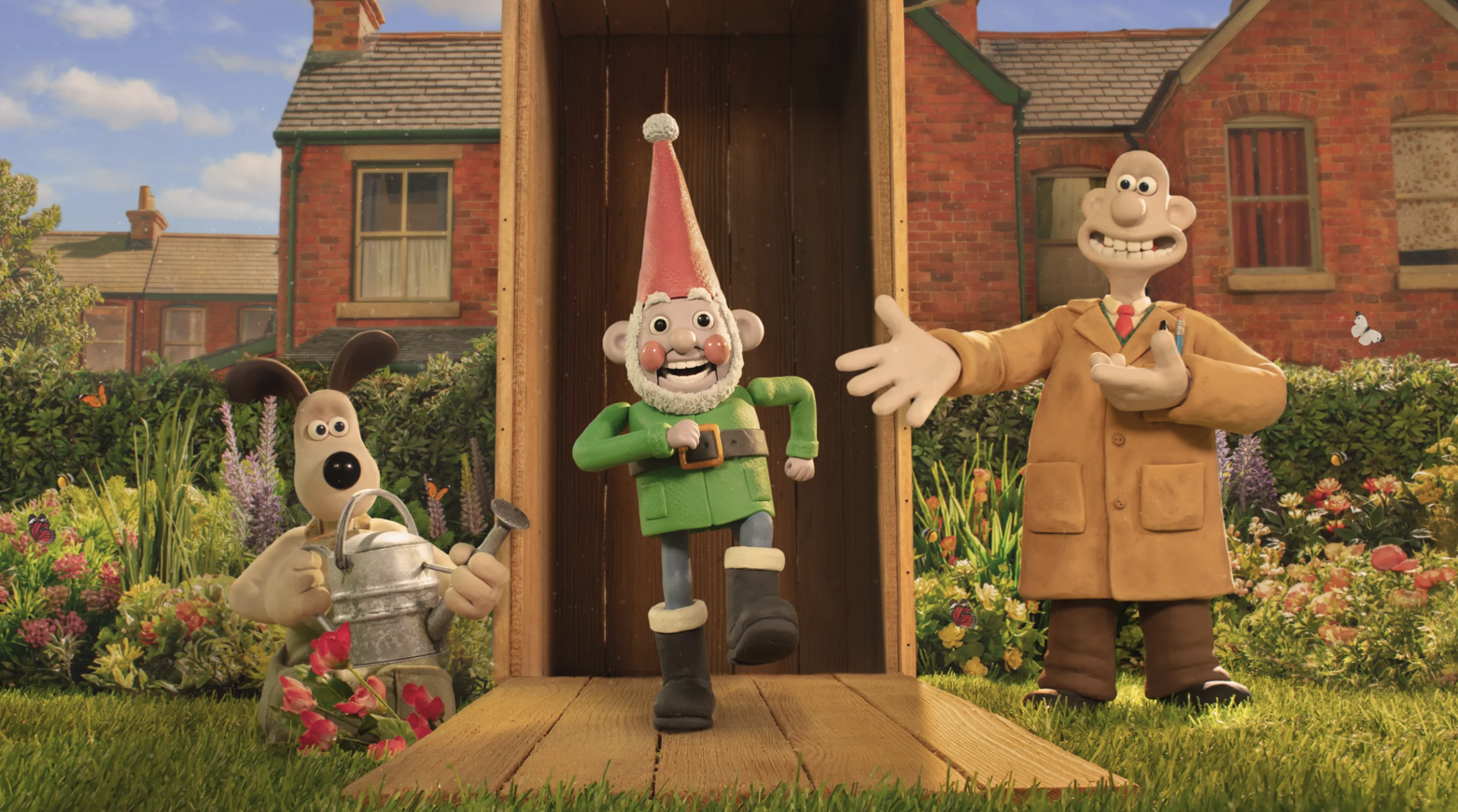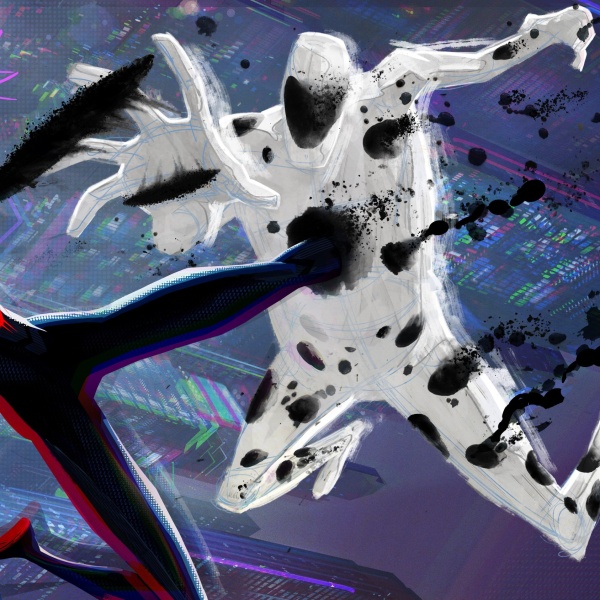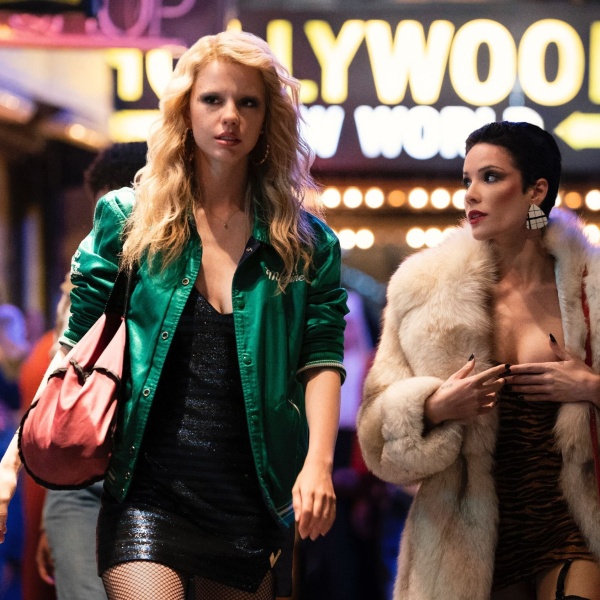It’s all about the fingerprints. Stop-motion animation intrinsically calls attention to its creation — the time-intensive nature of the process, the sheer amount of labor built into the design, the communal strength necessary for any project to come to fruition. The fingerprints left by filmmaker Nick Park and his comrades at Aardman Animation on the clay figures of their flagship duo Wallace and Gromit are visual proof of the tactility inherent in their construction. Because they were molded by hand, every adventure they embark upon—or, more accurately, every Wallace-related scrape from which Gromit helps them escape—has a personal touch that radiates from the screen.
In “Wallace & Gromit: Vengeance Most Fowl,” the duo’s second feature-length film, Park and co-director Merlin Crossingham juxtaposes humanity — the kind that brought the eponymous inventor and beagle to life — against technology run amok. The contraptions that the eccentric Wallace crafted were always faulty, Rube Goldberg-like solutions to simple or nonexistent problems. They usually never worked as intended and frequently caused trouble, but there was a charm to Wallace’s determination and, yes, a handmade quality to his machinery. In “Vengeance Most Fowl,” however, Wallace has followed the lead of Big Tech and embraced the “wonders” of smart technology. He’s relinquished almost all aspects of life to devices up to and including giving Gromit — Wallace’s eminently capable, permanently skeptical best friend — a pat on his head.
A silent, introverted dog, Gromit prefers to garden by day and read Virginia Woolf by night; in other words, he likes a quaint life without the need for technological intervention. He sees how far down the automated rabbit hole his master has fallen, but even he’s taken aback when Wallace introduces Norbot, an artificially cheerful “smart” gnome programmed to help Gromit maintain their grounds. The Norbot’s assistance not only eliminates Gromit’s relaxing daily routine, but turns their lovely garden into a cold place unsullied by the imperfections of hands or paws. As Wallace (voiced by Ben Whitehead, who replaced Peter Sallis after his death in 2017) prattles on about the need to embrace technology, the long-suffering Gromit stares longingly at an old kettle gathering dust on the mantle, knowing in his heart that it works just as well or better than any new-fangled water-boiling gadget.
“Vengeance Most Fowl” isn’t some dry lecture on technological overreach, as Mark Burton’s screenplay neatly addresses the visual elephant in the room throughout the noir-tinged thriller. It’s been almost 20 years since Wallace and Gromit’s last outing, 2005’s Hammer Horror-parody “The Curse of the Were-Rabbit,” and naturally animation techniques have considerably advanced since then. While “Vengeance Most Fowl” retains many of the quaint elements and tried-and-true methods that made Wallace and Gromit a global favorite, it’s also undoubtedly a slicker, glossier project than anything that’s come before. The figures are no longer entirely made of clay (they’re a mixture of clay and silicon) and computer-generated visual effects are everywhere in the film, especially during the climactic boat chase that features pristine animated water. “Vengeance Most Fowl” updates the look of Wallace and Gromit’s established world by combining classical craft and cutting-edge tools to fit the modern era. While the results are seamless (Aardman Animation never phones in the work) and the cheeky comic tone remains the same, it inevitably calls attention to the loss of something intimate and handcrafted that was previously part of the infrastructure.
In form and content, “Vengeance Most Fowl” confronts this reality through the return of Feathers McGraw, a devious penguin criminal mastermind whose plan to steal a diamond was foiled by Wallace and Gromit in the 1993 short film “The Wrong Trousers.” Since then, Feathers has been imprisoned in the local zoo, which Park and Crossingham design like a prison, plotting his revenge against the hometown heroes who put him away. From behind bars, Feathers remotely hacks Wallace’s Norbot and turns him evil. Suddenly, the Norbot builds an army of other smart gnomes who steal tools from the townsfolk, terrorize the neighborhood, and conspire to break Feathers out of the zoo so he can take back the diamond. Just like with the techno-trousers, Feathers uses Wallace’s invention against him, but now he’s also made him a prime target in the eyes of his neighbors and the press as an inept inventor capable of anything… even stealing a diamond he previously recovered. It’s up to Gromit to conduct an investigation to help his friend.
Anyone familiar with the Wallace and Gromit series can forecast what happens on a broad narrative level: Gromit’s nagging suspicions about the Norbots prove right, Wallace finds out the truth only when it becomes glaringly obvious, and the two of them have to evade mortal danger and save the day. “Vengeance Most Fowl” doesn’t suffer from predictability — if anything, there’s a cozy comfort to watching these two hit familiar marks — but it does falter when the action deviates too far from the film’s cherished leads. Feathers and the Norbot(s) are essentially one-note sight gags, and though that note sometimes hits well at the appropriate time, it can also threaten to become monotonous. Meanwhile, the former Constable, now Chief Inspector Mackintosh (Peter Kay) from “Were-Rabbit” returns alongside a new recruit, the plucky, gifted PC Mukherjee (Lauren Patel); the two can be amusing, but their parallel hijinks feels too divorced from the main action, and their banter just can’t compare to Wallace and Gromit’s chemistry.
Unsurprisingly, it’s that relationship that grounds the film as it cycles through multiple villains and elaborate “Mission: Impossible”-style chase scenes. Wallace and Gromit are as dependable as Wensleydale cheese, and it would take an especially hardened person not to become a tad verklempt seeing the two of them express their love for each other — both in words and Buster Keaton-like facial expressions — when the going gets tough. Park and Crossingham rarely lose sight of their bond even as the action expands to blockbuster territory. “Vengeance Most Fowl” ultimately equivocates on the pervasiveness of technology: it’s not about the tool, but the man (or animal) that uses it, evidenced by the Norbot army proving useful in a crisis. Yet, there’s an understanding that even as the tools develop beyond our wildest imaginations, it’s important to retain the delightfully ordinary so that people don’t lose sight of the humans behind the machines.
Grade: B
“Wallace & Gromit: Vengeance Most Fowl” premiered at AFI Fest 2024. It will be available globally January 3, 2025 on Netflix, except for the UK where it will be available on BBC iPlayer and BBC One Christmas 2024. It will also be available in select theatres beginning December 18, 2024.








